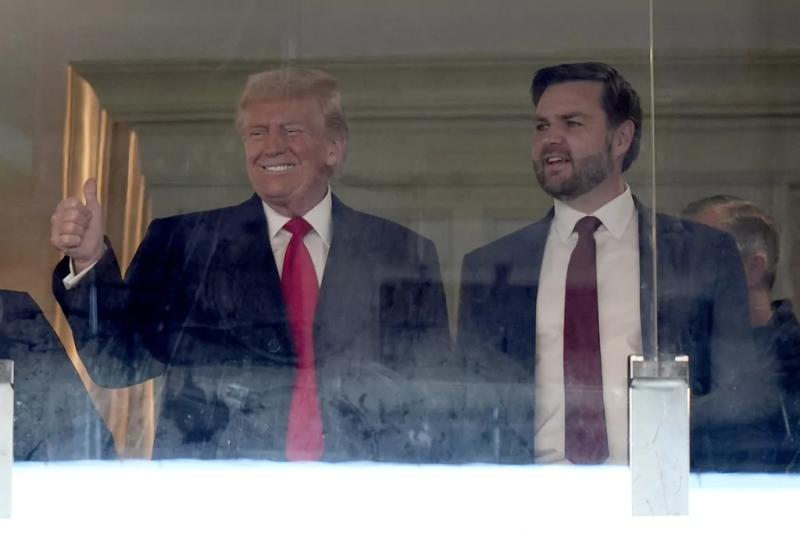The Catholic social teaching administration
By: Jeremiah Poff



Vice President-elect J.D. Vance is not a typical Republican in the corporate-friendly international interventionist mold that has dominated the party for the last several decades. Since he ventured into the political arena two years ago with a successful bid to represent Ohio in the U.S. Senate, Vance has effectively and conscientiously challenged a number of long-standing orthodoxies within the Republican Party.
The rise of Vance has alarmed the old guard of the GOP, who correctly recognize that his ascendance has ensured that the populism espoused by President-elect Donald Trump will endure far beyond his upcoming four-year term in office.
But the instinctual conservative populism of Trump is different from the intellectually guided populism of his soon-to-be vice president in a key way: Vance's ideology stems in part from the economic and social teachings of Catholicism, the faith to which Vance converted five years ago.
In an interview with conservative author and columnist Rod Dreher after he was received into the Catholic Church, Vance singled out Catholic social teaching as a major influence on his views.
"My views on public policy and what the optimal state should look like are pretty aligned with Catholic social teaching," he said at the time. "That was one of the things that drew me to the Catholic Church. I saw a real overlap between what I would like to see and what the Catholic Church would like to see. I hope my faith makes me more compassionate and to identify with people who are struggling."
As the days have ticked down to Inauguration Day, Trump has filled out his administration with numerous Catholics for high-level roles, including Vance, health and human services secretary nominee Robert F. Kennedy Jr., labor secretary nominee Lori Chavez-DeRemer, secretary of state nominee Marco Rubio, transportation secretary nominee Sean Duffy, and education secretary nominee Linda McMahon.
The nominees are significant not simply because of their religion but because of the sort of influence Catholic social teaching will have on the new administration. It is an influence that represents a fundamental change for a party that has, in the past, generally embraced laissez-faire economics and eschewed any form of social spending as a "handout."
Catholic economics
Summed up, Catholic social teaching is an approach to economics and civil society that centers virtue and the common good above motivations such as wealth accumulation and industrial advancement. A policymaking agenda informed by Catholic social teaching would embrace a socially conservative worldview that opposes abortion, contraception, and extramarital relations but would also provide social support to families and oppose the exploitation of workers by providing them with a living wage that allows workers to provide for themselves and their families.
The seminal document of Catholic social teaching is Rerum Novarum, an encyclical letter written by Pope Leo XIII in 1891 that addressed the roles and responsibilities of politicians, workers, and employers in building an economy and a civil society that serves the common good.
The letter is quite long and touches on a great number of questions that were raised at the time of its publication, all of which are still salient today, especially its foundational thesis that the economy should first and foremost serve the well-being of families.
The letter rejects socialism and defends the right to property but also condemns the exploitation of workers by employers and calls for laws that ensure widespread property ownership and prevent the consolidation of wealth among a small class. The letter also includes an explicit and wholehearted endorsement of unions, which Pope Leo compared to "the artificers' guilds of olden times."
The letter is seen as so fundamental to a Catholic view of a just society that 40 years after it was published, Leo's successor Pope Pius XI issued Quadragesimo Anno, which reiterated many of the same themes while adding a more explicit critique of classical liberalism that expanded upon what Pope Leo had written.
"Let all remember that liberalism is the father of this socialism that is pervading morality and culture and that Bolshevism will be its heir," Pius XI wrote.
In 1981, Pope John Paul II wrote another follow-up letter, Laborem Exercens, that focused primarily on the role of work in an ordered life. In that letter, he likewise spoke of the importance of securing a just wage that allowed a worker to provide for his family. Ten years later, he issued another follow-up, Centesimus Annus, which marked the 100th anniversary of Leo XIII's initial letter.
Breaking with liberalism
The critique of liberalism in Quadragesimo Anno is key to understanding how Catholic social teaching will feature in the second Trump administration. Placing the family unit and the common good at the center of all policymaking decisions allows for a more robust role for the government than the more limited view that dictates the market should be left to its own devices.
Among the first Catholic politicians to articulate this view of policymaking was Sen. Marco Rubio (R-FL), who spoke openly about Rerum Novarum in a speech at the Catholic University of America in 2019. Shortly after he was elected, Trump tapped Rubio to be his secretary of state.
While Catholic social teaching has little in the way of specific policy prescriptions, what it does provide is a philosophical outlook for how to approach policymaking. This is where the new Trump administration is filling in the gaps.
For instance, as the incoming administration seeks to extend the 2017 Tax Cuts and Jobs Act, the Trump team is seeking to expand the child tax credit, thereby lessening the tax burden on working families.
As Rachel Bovard, the vice president of programs at the Conservative Partnership Institute, told Politico recently, "The market is not an end unto itself. The market has a purpose — and that is to create a free and flourishing society. If the family is not doing well, society is not doing well. We need to make sure our public policy is helping family to function."
Expanding the child tax credit is only one way of doing that. Trump's embrace of trade protectionism hearkens to the principle of subsidiarity, an aspect of Catholic social teaching that views locally oriented economies and political order as the most ideal. By imposing trade barriers to foreign goods that are also manufactured in the United States, this economic protectionism ensures that communities maintain their economic engine, thereby providing a dignified job with a living wage to the families of those communities.
When it comes to labor unions, Trump has signaled an unusual degree of friendliness toward them for a Republican administration, which echoes another aspect of Catholic social teaching. But this required a two-way street. In Laborem Exercens, Pope John Paul II explicitly warned against partisanship seeping into organized labor, and most unions had become an extension of the Democratic Party machine.
But eschewing partisanship was exactly what Sean O'Brien, the president of the International Brotherhood of Teamsters, did. He spoke at the Republican National Convention at Trump's invitation while simultaneously trying to secure a speaking slot at the Democratic National Convention. Later, the union declined to endorse a candidate for the first time since 1996, ending a streak of six consecutive presidential elections in which the union had backed the Democratic ticket.
After the election, free of partisan trappings, the Teamsters met with Trump, who chose Chavez-DeRemer to run the Department of Labor, the Teamsters' preferred candidate for the job.
A coalition for the common good
In his winning presidential campaign, Trump secured the support of an eclectic coalition that included religious conservatives, union members, the white working class, the Hispanic working class, young men of all demographics, cryptocurrency fans, and business leaders. It was the most diverse racial and socioeconomic coalition that a Republican presidential candidate had assembled arguably since Richard Nixon in 1972, but perhaps ever.
That coalition had been forced to endure four years of a Biden presidency that had seen wages stagnate, inflation skyrocket, housing become unaffordable, and safety become a luxury. If the foundational principle of Catholic social teaching is preserving the common good, Biden, the nation's second-ever Catholic president, embraced a partisan agenda that came at the expense of the common good.
Make America Great Again is a promise to restore the common good. It is a promise of safe and healthy communities, affordable housing, minimal inflation, higher wages, and prosperity for all. It is a promise that, intentionally or not, is rooted in the foundational principle of Catholic social teaching and built the most diverse winning Republican coalition in history.







There's going to be a lot of establishment resistance, from both sides of the aisle and from business itself. They made greed acceptable in the 80's and they haven't looked back since. Doesn't mean they shouldn't try.